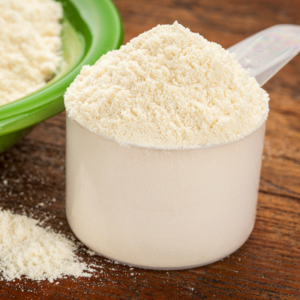 When selecting the perfect protein for your product there’s a lot to consider: how will the product be processed, what’s the product’s pH and who is the intended audience are just the tip of the developmental iceberg. Take for example the weight loss and sport nutrition market segments: why is one protein valued over another and is there clinical evidence to support and validate its usage? This is where food science crosses over with medical science, and as food scientists we needs to be able to evaluate the clinical evidence on how various proteins affect the human body. In this blog piece we’ll discuss the biology of milk protein concentrate and isolates on the human body and why these protein selections are perfectly suited for products in these market segments.
When selecting the perfect protein for your product there’s a lot to consider: how will the product be processed, what’s the product’s pH and who is the intended audience are just the tip of the developmental iceberg. Take for example the weight loss and sport nutrition market segments: why is one protein valued over another and is there clinical evidence to support and validate its usage? This is where food science crosses over with medical science, and as food scientists we needs to be able to evaluate the clinical evidence on how various proteins affect the human body. In this blog piece we’ll discuss the biology of milk protein concentrate and isolates on the human body and why these protein selections are perfectly suited for products in these market segments.
What is Milk Protein Concentrate or Milk Protein Isolate?
Milk protein concentrate/isolate (MPC/MPI) is a concentrated (at least 80% protein) or an isolated (at least 90% protein) form of milk protein via a process called ultrafiltration. During this process excess fluid, fats and carbs are either evaporated and/or filtered out leaving unadulterated milk protein. The benefit of this process is that when you create the MPC/MPI in either liquid or via spray drying, it retains the same ratio of casein to whey as one would find in traditional fluid milk: 80% casein and 20% whey. From a biological perspective this is ideal for many reasons:
- Milk as a stand-alone protein is nutritionally complete, high quality and very bioavailable
- MPC/MPI are naturally low in lactose due to the ultrafiltration, making it easier on the stomach for those with sensitivities to dairy or dairy sugars
- Casein is well known for being a slow-to-digest protein and provides a sustained delivery of amino acids to the body
- Whey is well known for being a quick-to-digest protein that is quickly, easily and readily absorbed by the body
- Proteins, especially dairy proteins, are known for aiding in the biological feeling of satiety, or fullness
- MPC and MPI tend to be cold-processed which means more native proteins (as opposed to denatured)
Through The Market Lens
When analyzing the sports nutrition market, there is a disproportional amount of products based on whey protein, mainly due to the well documented ability to aid in muscle synthesis and repair post heavy-load work (and also due to its relative ease in product formulation). There are also supplements built on casein that are designed as “overnight protein delivery systems,” but they’re hard to find and are typically manipulated caseins such as calcium or sodium caseinate. It’s actually great marketing – the consumer is forced to have their “daytime” protein and their “nighttime” protein. But is this beneficial or practical for most end-users? No. Since the human body needs a constant supply of protein throughout the day taking just one serving of whey protein is not ideal.
Developers that choose to formulate with MPC and MPI are giving their end-users not only the benefit of the whey protein component, but also the staying power and long-term delivery of amino acids from the casein (as opposed to caseinates, heavily used as “casein supplements”). MPC & MPI are literally a dream protein for sports nutrition products that are biologically complete and easy to work into formulations.
Looking through the lens of the weight loss market, there are many advantages to incorporating MPC & MPI into formulations. Firstly, the casein component will help to aid in end-user satiety. Since we know primarily whey-based beverages are quickly digested, this offers a truly functional advantage. Secondly, since MPC & MPI are ultra-filtered to concentrate protein and decrease carbohydrates (i.e. lactose), this opens up the window for other types of carbohydrates to be used, especially those rich in dietary fibers to help synergistically aid in satiety and enhanced mouthfeel. Thirdly, there is the emulsification factor in that MPC & MPI are great emulsifiers. This adds to the creaminess and overall mouthfeel of finished goods; and, when well formulated and processed, can eliminate the need to extraneous texturizers like hydrocolloids. MPC & MPI are power proteins in so many ways for the weight loss nutrition market.

